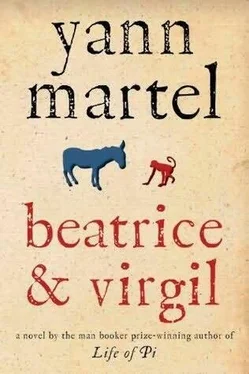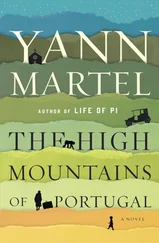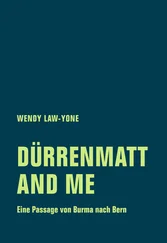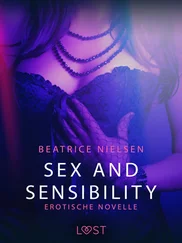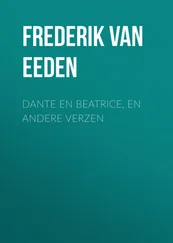Before long, the light grows dimmer, the hues deeper, and darkness begins to fall upon the land. While the wind continues to conduct its usual barter, one spore for one smell, the Shirt now appears marked with immense blue and grey stripes that traverse it from north to south.)
The taxidermist lifted his eyes and spoke. "I imagine these stripes being projected not only on the back wall but right across the stage and onto the spectators. The whole theatre will be printed in blue and grey stripes."
"What about the landscape?"
"It will also be projected onto the wall, like the posters about Virgil. The stage will be bare, except for the tree to the side. The most prominent feature will be the huge back wall, probably curved, like the wall for a diorama."
"And the wind?"
"Loudspeakers. They do amazing things nowadays with sound systems. The description I give of the wind is just to give the sound designer an idea. I imagine Virgil and Beatrice standing motionless and this wind being heard very distinctly for a good minute or two, a soft, rich wind. Then the landscape will be projected and after that the stripes."
He returned to his text:

"Collar is another province," the taxidermist informed Henry.
"Yes, I understood that."
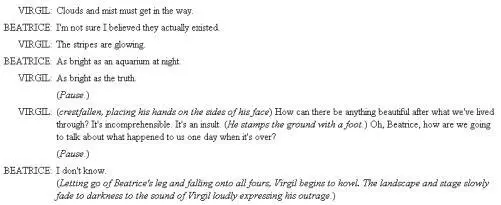
"And then we'd hear Virgil's howl, starting with his alone, then augmented by other howler monkeys' howls and projected through the sound system. I want a great and terrible symphony of howls."
"Why does the Shirt have stripes? Why that detail? It reminds me of-"
The doorbell tinkled. Without a word or gesture to Henry, the taxidermist stood up and left for the showroom. Henry sighed and looked at Virgil and Beatrice.
"Does he always interrupt you like this?" he asked Virgil.
Henry remembered the bell in the Flaubert story, when the stag comes up to Julian, just before it curses him. Except that bell must have tolled rather than tinkled. Henry got up and went to look at the newly finished deer head. He could hear the taxidermist speaking to someone in the other room. Henry drank more water at the sink, holding a new glass with both hands. He examined the rabbit. It still had its ligaments, which is why the skeleton hadn't fallen to pieces. The ligaments looked like thin spaghetti.
The taxidermist returned. He removed his apron. "I must go," he said curtly.
"That's fine. I should be going, too."
Henry gathered his coat.
"When will you come back?" the taxidermist asked.
He's so damn up-front and direct, with questions that are orders, Henry thought.
"Why don't we go to the zoo together? We have our choice." The city enjoyed the luxury of having two zoos and Henry liked zoos. It was where he'd started his career, in a way. "I'm sure you'd have a fascinating take on live animals. I spent weeks researching-"
"Zoos are bastard patches of wilderness," the taxidermist cut in as he put on his coat. "The animals there are degenerate. They shame me."
Henry was taken aback. "Well, zoos are a compromise, that's for certain, but so is nature. And if it weren't for zoos, most people would never see real-"
"I go only when I have to, for work, to see a live specimen."
Henry could hear in the taxidermist's voice the judge's gavel coming down again. The taxidermist was directing him out of the workshop with broad, imperative gestures.
I will get him to bend, thought Henry.
"I see zoos as embassies from the wild, each animal representing its species. In any case, let's meet at the cafe up the street. The weather is so nice now. How about this coming Sunday at two o'clock? That's what I have time for." Henry put a firm edge to his last words.
"All right. Sunday at two at the cafe," the taxidermist agreed tonelessly.
Henry was relieved. "I have a question," he followed up smoothly as they passed through the showroom. "It's been on my mind since I read the opening scene from your play: why this minute description of a common fruit? It seems an odd start."
"How did you put it?" replied the taxidermist. "'Words are cold, muddy toads trying to understand spirits dancing in a field'?"
"Yes. I said 'sprites'."
"'But they're all we have.'"
"'But they're all we have,'" Henry repeated.
"Please," the taxidermist said, opening the front door of the store and ushering Henry out. "Reality escapes us. It's beyond description, even a simple pear. Time eats everything."
And with that, leaving Henry with the image of Time eating a pear into oblivion, the taxidermist practically slammed the door in Henry's face. He locked it, turned the cardboard sign hanging from its frame from open to closed, and disappeared back into his workshop. Henry took no offence at the lack of ceremony bordering on rudeness. He must behave like this with everyone, he guessed. It was nothing personal.
At least Erasmus was glad to see him. The dog was jumping up and down, yelping with joy.
Henry had meant to ask the taxidermist another question. On the Shirt, there wasn't only a monkey and a donkey and a tree and a country road and a picturesque landscape. There was also "a boy and his two friends". So there were people in the play too?
At home, Henry told Sarah about his second visit with the taxidermist.
"He's a real character. As surly as a badger. And his play, I can't figure it out. There are animal characters-a monkey and a donkey-and they live on this very large shirt. It's all quite fanciful, yet there are elements that remind me, well, that remind me of the Holocaust."
"The Holocaust? You see the Holocaust in everything."
"I knew you'd say that. Except in this case there's an emphatic reference to striped shirts, for example."
"So?"
"Well, during the Holocaust-"
"Yes, I know about striped shirts and the Holocaust. But Wall Street capitalists also wear striped shirts, for example, as do clowns. Everyone has a striped shirt in their closet."
"Perhaps you're right," Henry said.
He was irked. Sarah had long ago lost interest in the Holocaust, or at least in his creative involvement with it. And she was wrong. It wasn't that he saw the Holocaust in everything. It's that he saw everything in the Holocaust, not only camp victims, but also capitalists and many others, perhaps even clowns.
***
That Saturday, Henry and Sarah went shopping for the soon-to-come baby. Stroller, bassinet, a sling, the tiniest clothes-they bought these items with a smile stuck on their faces the whole time.
They weren't very far from the taxidermist's store. On an impulse Henry suggested that they drop by. Sarah agreed. It was a mistake. The visit went badly. Standing outside the store, Sarah granted that the okapi looked attractive. But as soon as they entered, Henry could tell Sarah didn't like the place. When the taxidermist emerged from his lair, she seemed to cower. Henry showed her around, pointing out details, trying to elicit an enthusiastic response. Sarah's remarks were short and she mechanically nodded her head in agreement to whatever Henry said. She looked tense. The taxidermist, for his part, glowered. Henry did all the talking.
They'd hardly got home before they started at each other.
"He's helping me," Henry said.
"What do you mean he's helping you? How? With that hideous monkey skull he tricked you into buying? What is that monstrosity? Yorick to your Hamlet?"
"I'm getting ideas off him."
"Of course, I'd forgotten. The monkey and the donkey. Winnie the Pooh meets the Holocaust."
Читать дальше
